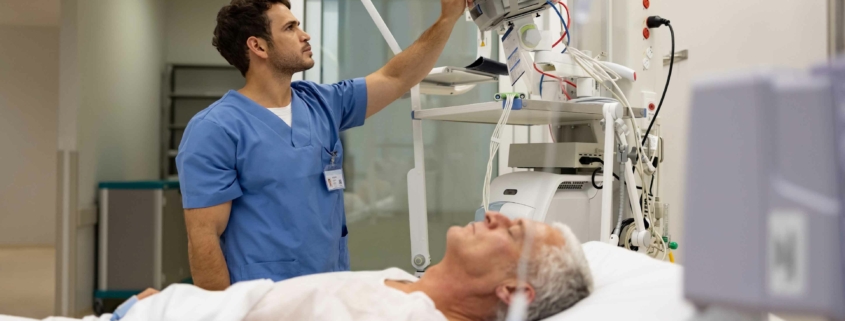Help Patients Reach Their Dreams With the SDS Credential
The Sleep Disorders Specialty, or CRT-SDS/RRT-SDS credential, is a specialty credential developed to validate the knowledge and skills of a registered respiratory therapist who performs sleep disorders testing and therapeutic intervention. Beyond general respiratory care activities, it focuses on competencies unique to diagnosing and treating sleep disorders. Since 1977, the NBRC has maintained accreditations for all examinations with the National Commission for Certifying Agencies, which is not the case for other sleep examinations offered.
The Sleep Disorders Specialty examination is available for anyone who is a certified respiratory therapist (CRT) or registered respiratory therapist (RRT) and has completed a CoARC-accredited respiratory therapist education program that includes a sleep add-on track; or someone who is a certified respiratory therapist (CRT) for at least six months before applying for the SDS examination; or someone who is a registered respiratory therapist (RRT) for at least three months before applying for the SDS examination. The SDS examination contains 180 multiple-choice items (160 scored and 20 pretest) and you will be given four hours to complete it.
For many years, holding a CRT or RRT credential while working within a Joint Commission accredited hospital was sufficient for Centers for Medicare and Medicaid Services (CMS) reimbursement of sleep disorders testing, but this has begun to change. Around 2015-2018, CMS LCDs (local coverage determinations) began to require sleep lab-specific accreditation, and general hospital accreditation was no longer sufficient. This change means you can still work as a sleep tech with an RRT/CRT credential. Still, you may not be able to serve as the leading registered tech for the lab or score HSTs without a sleep credential, making career advancement more challenging.
State licensure for sleep technologists is another consideration. According to the American Association of Sleep Technologists website, there are currently 12 states with a Polysomnography Practice Act requiring sleep technologists to hold a specific license. There are three pathways for RTs working in sleep medicine:
1. Specific language listing the SDS credential (four states),
2. Exemption from licensure requirement for RTs, and
3. Language stating that another equivalent exam is acceptable for licensure.
According to the Sleep Foundation, 50 million to 70 million people in the U.S. have ongoing sleep disorders. Sleep deprivation is a serious condition and is linked to an increased risk of mortality, and just like other medical conditions, the incidence of most sleep disorders increases with age. With an aging, sleep-deprived, increasingly educated population, it will become increasingly important that there are specialists with a strong understanding of the importance of sleep and treatment options for various sleep disorders. Achieving the SDS credential will provide this foundation and give more practitioners the confidence and motivation to make sleep medicine a regular part of daily patient and provider interactions.
With the drive for increased efficiency and improvements in telemedicine, rural hospitals are increasingly dependent on remotely located physicians who cover multiple hospitals overnight. When there is a hospitalist available, they typically look to an RT for advice on a patient’s sleep-disordered breathing. RTs are uniquely positioned to help improve the quality of patients’ lives by becoming the resident resource around sleep.
These days, more and more patients administer sleep tests at home because they can save money and enjoy the convenience of being able to stay in their home. However, they miss out on the interaction and education a certified sleep technologist can provide. It’s important that providers educate patients to rely on their sleep specialist to receive better treatment options and care.
The future of sleep medicine may rest in the hands of emerging technologies, such as artificial intelligence (AI). The use of AI in the scoring of sleep studies has been around for several years, and it’s gaining traction as the American Academy of Sleep Medicine (AASM) currently has an entire committee dedicated to reviewing advancements in AI. The combination of revolutionary technology and expert practitioner care makes RTs uniquely qualified to integrate data from multiple sources to decide on the best care for patients. These factors have made respiratory sleep medicine a leader in AI integration.
With baseline knowledge and real-life experiences working in multiple areas of healthcare – sleep specialists are poised not only to exist, but flourish in this future, data-driven environment. RTs with a firm sleep medicine foundation are positioned to provide leadership as AI propels the sleep field forward. The SDS credential proves a practitioner is dedicated to providing expert patient care and is the ultimate sleep resource in critical situations.
For RTs in sleep medicine with increasing regulatory (CMS, AASM) requirements, the desire for credential maintenance efficiency, or career advancement, the SDS credential will help you achieve your goals. For those working outside the sleep lab, becoming the primary resource for patient and provider sleep disorder questions will increase your value to the healthcare team and improve patient experience and potential outcomes.




